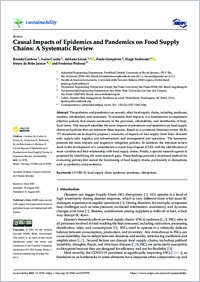Causal impacts of epidemics and pandemics on food supply chains : a systematic review
- Cardoso, Brenda Industrial Engineering Department, Pontifical Catholic University of Rio de Janeiro—PUC-Rio, Rio de Janeiro, Brazil
- Cunha, Luiza Industrial Engineering Department, Pontifical Catholic University of Rio de Janeiro—PUC-Rio, Rio de Janeiro, Brazil
- Leiras, Adriana Industrial Engineering Department, Pontifical Catholic University of Rio de Janeiro—PUC-Rio, Rio de Janeiro, Brazil
- Gonçalves, Paulo Facoltà di scienze economiche, Università della Svizzera italiana, Svizzera
- Yoshizaki, Hugo Production Engineering, Polytechnic School, Sao Paulo University, Sao Paulo, Brazil
- de Brito Junior, Irineu Environmental Engineering Department, Sao Paulo State University, Sao Jose dos Campos, São Paulo, Brazil
- Pedroso, Frederico Urban, Disaster Risk Management, Resilience & Land, World Bank, Washington DC, USA
-
31.08.2021
Published in:
- Sustainability. - MDPI. - 2021, vol. 13, no. 17, p. 28
English
The epidemics and pandemics can severely affect food supply chains, including producers, retailers, wholesalers, and customers. To minimize their impacts, it is fundamental to implement effective policies that ensure continuity in the provision, affordability, and distribution of basic food items. This research identifies the main impacts of pandemics and epidemics on food supply chains and policies that can minimize these impacts. Based on a systematic literature review (SLR), 173 documents are analysed to propose a taxonomy of impacts on four supply chain links: demandside, supply-side, logistics and infrastructure, and management and operation. The taxonomy presents the main impacts and respective mitigation policies. In addition, the literature review leads to the development of a comprehensive causal loop diagram (CLD) with the identification of main variables and their relationship with food supply chains. Finally, a specific research agenda is proposed by identifying the main research gaps. These findings provide a structured method for evaluating policies that ensure the functioning of food supply chains, particularly in disruptions such as epidemics and pandemics.
- Language
-
- English
- Classification
- Economics
- License
- Open access status
- gold
- Identifiers
-
- RERO DOC 333716
- DOI 10.3390/su13179799
- ARK ark:/12658/srd1319304
- Persistent URL
- https://n2t.net/ark:/12658/srd1319304
Statistics
Document views: 313
File downloads:
- Texte intégral: 507
